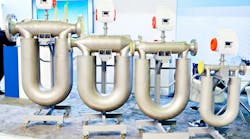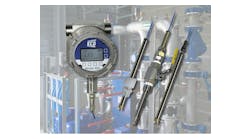Jeffrey Denoncourt is North American custom water systems manager for the Lab Water Division of Millipore. Mr. Denoncourt has over 20 years experience in water purification research, product development, and design. Millipore’s Lab Water Division provides water purification systems, consumables, accessories, and support for the design, installation, validation, and maintenance of total water systems. The company uses pump and filtration products for distributing and maintaining water quality in a laboratory piping systems for biopharmaceutical applications. Mr. Denoncourt can be reached at 781 533-5446 or [email protected].
Q: What are some of the key factors that go into specifying pump & filter technology for the pharmaceutical process?
A: In any situation, it is most critical to understand the needs of the customer. From our perspective, we typically investigate the water quality, water quantity, destination points of use, and when the water is needed. Better comprehension of these customer needs yields better equipment selection, including pumps and filters. Failure to pay attention to these details can result in compromised purity as well as a system that does not properly meet the water quality or quantity needs of the customer.
Q: How has ultrapure pump & filter technology evolved over the last 5-10 years to better meet the requirements of the pharmaceutical process?
A: In recent years, there is a greater awareness of water quality and the correlation it has on the pump design. Additionally, current Good Manufacturing Practices (cGMP), regulations as stated in the Code of Federal Regulations (CFR), guidance published by the International Society of Pharmaceutical Engineering (ISPE, www.ispe.org) or the United States Pharmacopeia (USP, www.usp.org), and industry norms offer users better guidelines to follow when striving for consistent and accurate results.
Advances in piping materials, such as valves that minimize dead-legs and overall system monitoring, help limit the risks associated with contamination. Millipore has the added capabilities to monitor the resistivity and total organic carbon (TOC) of purification systems as well as purified water flowing through a distribution loop.
Q: How directly does the regulatory aspect of the pharmaceutical process touch pump & filter technology? What specific characteristics should users be looking for in ultrapure pumps & filters to ensure compliance?
A: In general, regulatory agencies require control mechanisms and documentation to show that good design practices were followed throughout the process and implementation stages. Millipore is not a pump manufacturer. Therefore, we rely on the manufacturers’ documentation and design specifications for materials, performance, connections, etc. We require them to provide certification upon delivery that confirms their in-house testing and published performance.
Q: What should users be looking for in terms of efficiency and precision when specifying pumps & filters for the pharmaceutical process?
A: Users should select vendors that:
- Take the time to work with end users and engineers to completely understand, determine, and document the water purification requirements.
- Comprehend the layout of piping and design in respect to length, type, altitude changes, as well as number and type of fittings.
- Acknowledge design considerations such as maintaining turbulent flow, pipe material, and weld options, minimizing deadlegs to lessen the risk of bioburden and material growth.
- Accommodate for pressure requirements at the points of use and throughout the distribution loop.
- Provide detailed design characteristics and selection criteria linked to distribution pump performance curves.
Q: What can users realistically expect in terms of corrosion resistance from ultrapure pumps & filters used in pharmaceutical processing? What is a typical lifespan for pumps & filters used in the pharmaceutical process?
A: Many engineers are not aware that ultrapure water is a very aggressive solvent and can degrade materials in contact with it. Therefore, it is critical to select pump wetted materials that are compatible with high-purity water. This limits corrosion and prevents water quality degradation. While Millipore is not a pump manufacturer, our experience has shown that a pump selected using good design practices can operate for approximately 10 years with minimal maintenance.
Q: How do you see ultrapure pump & filter technology evolving over the next 5-10 years to better meet the requirements of the pharmaceutical process?
A: Again, in our experience we anticipate that the technological advances will allow more contaminant-specific filtration devices to be developed. This will allow filters to be specialized in order to meet the specific contaminant requirements of different applications.
For more information: millipore.com

